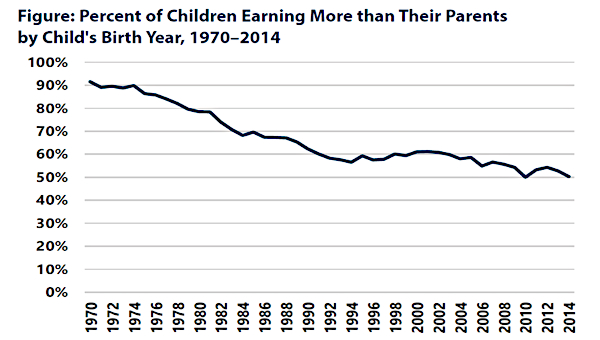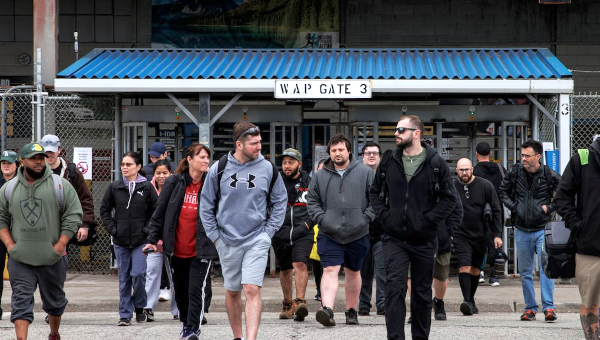‘Open the Economy’? The Pandemic, Costs, Benefits, Capitalism
It is mid-June 2020. Everywhere there is a push to ‘open the economy’. What is meant, of course, is to bring back, as soon as possible, the profit-seeking activities of capitalist firms. It is an unchallenged assumption that the return of normal capitalism, that is, the ceaseless drive for the private accumulation of socially produced wealth, is crucial to overall welfare. But even as the push seems irresistible, there are murmurings of concern. What if the virus is not as beaten as the policymakers think it is? What if, like Rocky, it makes a stunning comeback? Should we not be more certain ere there is a return to full-blooded capitalist activities? After all, it requires a balancing of lives against economic welfare. Should that be even contemplated?

Weighing lives against the potential to gain material wealth is a norm. Indeed, the legal system repeatedly endorses that kind of balancing. As Richard Posner, a highly regarded legal scholar (now a senior federal US judge) observed:
“Only the fanatic refuses to trade off lives for property although the difficulty of valuing lives is a legitimate reason for weighing them heavily in the balance when only property values are in the other pan.”1
He was stating the obvious. We know that we live with risks that will result in the loss of lives. Although we call the materialization of such risks ‘accidents’, they are actually and actuarially foreseeable. For instance, we know that if we put automobiles on the road, then, given a certain number of drivers, a known state of roads, climatic conditions, the thoroughness of licensing and monitoring systems, and the like, we can expect a certain number of injuries and deaths. Insurance companies set their policy rates using such data, including personal characteristics of owners and drivers. Manifestly, the risks tolerated can be changed by changing some of the things that set the level of risks. For instance, changes to the design of a car, the way in which roads are banked, the resources spent on the education of drivers, the banning of the use of electronic devices when driving, all would have an impact on the outcomes of driving automobiles. Risks are inevitable. We can, and do, manipulate the frequency and gravity of their materialization.
Scales and Standards
This is how standards of behaviour and production are set and become embedded in our practices and legal regulatory schemes. At any one time, the standards reflect the outcome of debates and struggles over what costs and harm-doings are to be tolerated in order to get benefits considered worthwhile. This is what Posner means when he conjures up scales with one pan of the scales containing the costs to life, the other the benefits that will be produced by any specific risk-creating activity.
For the exercise to be meaningful, a means is needed to give a value to a life. The Treasury Board of Canada provides a Cost-Benefit Analysis Guide for agencies and departments to assist them when setting standards of behaviour. It gives them a number. It is called the Value of a Statistical Life (VSL). While the number varies depending on which setting of risks is to be applied, the current median value of a Canadian life is $5.9-million. Armed with this ‘scientific’ number, regulators can now make some guesstimates as to whether allowing specific activities conducted in a prescribed manner might come at a cost to some lives and still be quantitatively worthwhile.
From this vantage point, the only good reason to be upset about the question as to whether we ought to be re-opening the economy, whether we should get out of ‘lockdown’, is an empirical one: will the costs of the debilitation and death rates that might ensue outweigh the costs of not opening the economy again (given that avoiding such economic losses is seen as a benefit)? Those who objected to the lockdown from the get-go vociferously say ‘NO’. Their view is caught by their slogan: “The cure is worse than the disease.” That sentiment underlies the policies of some nation states confronted by the pandemic. Both the US, the UK (and, perhaps, Canada’s slow reaction indicates a similar approach here) started off in this mode. They considered letting a few people die, have the rest be infected and thus gradually develop herd immunity. In due course, the incidence of death and debilitation would be outweighed by the economic wealth created by the growth generated by an uninterrupted economy. Sweden appears to be pursuing this road to recovery, accepting, what seems in the Scandinavian world, an extraordinary number of deaths in the process. Brazil appears to be on a similar path. Others see the need to shut down for a while longer, at least until the virus is tamed somewhat, arguing that their calculus will work out more beneficially.
What the pandemic is doing is bringing this balancing of costs and benefits into public view. The question whether governments should lift restrictions on normal activities, and when they should do so, has forced the balancing of lives against livelihoods out of the policymakers’ closet where it normally resides. And, because the outcomes of this balancing are alarming and surprising – deaths in Long-Term Care homes, health workers taking extraordinary risks, lowly regarded workers suddenly emerging as essential to our welfare, etc. – the nature of this balancing of costs and benefits, usually not seen and, if seen, perceived as the preserve of well-informed well-meaning social technocrats, is coming under scrutiny. It has explosive potential. Some people are beginning to ask themselves how it has come about that society got itself into such a fix that it now needs heroes. Bertolt Brecht, faced with the quotation “unhappy is the land that has no heroes” wrote: “No. Unhappy is the land that needs heroes.”2 This sentiment is gathering resonance. Some people are asking: how is public policy made, by whom, and for whom is it being made?
One issue that emerges from the debate about balancing lives against material welfare is that it is a quantitative exercise, a bloodless one. This shocks people who are told, again and again, that they should never put a price on human life, that life is priceless. This is why health workers dealing with infected patients are hailed as heroes: they are in danger and they save lives. At the same time, focussing on these acts of heroism also makes it clear that a disproportionate number of the victims are elderly people in Long-Term Care (LTC) homes and of those, a disproportionate number are in privately-run LTCs. In part, the vulnerability of inmates of these institutions is explicable because they are old and more fragile than other segments of the population. In part, however, what is becoming increasingly obvious is that they are bearing much of the burden imposed by cost/benefit analyses and decisions made in the past. Some time ago, governments began to spend less on funding these facilities and, even more significantly, increased the number of LTC facilities run by private profiteers. Overcrowding, understaffing, skimping on health and safety followed.3 Old people have been paying the costs. Who has benefitted? Bonus-earning executives and shareholders, like Mike Harris, the former Premier of Ontario, who pushed for the privatization of long-term care and joined the governing board of a major player in this for-profit field, have been winners.
What has come into view is that cost/benefit decisions are not just made by government policy wonks but also by unelected private owners of the means of production chasing profits for themselves. To the general public, to be told that the same lives healthcare workers are saving have been treated as tradeable for monetary gains pursued by profit-seekers leads to a ‘disconnect’. Some segments of the public may begin to question why it is being asked to go back to a normality where monetary gains mean so much. Why should normal capitalist operations be revived?
Wheels of Capitalism
In a capitalist political economy, the mantra is that, if capitalists succeed, everyone will benefit. The outcomes of the coronavirus plague in Canada are throwing some hefty spanners into the previously smoothly operating wheels of capitalism. The lockdowns have dramatically illustrated that capitalism never did provide all that much welfare for huge swathes of the population. It quickly became apparent that large numbers of people could not make mortgage, rent, or credit card payments, and that, at any one time, they were one to two paycheques away from penury. The argument that there should be a rush to return to this kind of normality is not all that persuasive. There is mounting doubt as to whether the benefits of ‘re-opening the economy’ will outweigh the costs. These doubts are bolstered by other instances of cost/benefit analyses which the pandemic is bringing into full view.
Healthcare workers and the facilities in which they work have had to scramble around for adequate personal protective equipment (PPE). This is what heightens the risks they have been facing and why they are praised for being so selfless and brave. The shortfall in PPE springs from some belatedly revealed cost/benefit decisions. After SARS, governments were given recommendations to make sure they had reserve PPE for the next epidemic. It was decided not to do anything. The costs (storage and manufacture) were apparently seen as outweighing the benefits. Seemingly, no thought was spent on readying public health institutions to do testing of any kind. Somewhere it was calculated that all precautionary work could be set aside. It was more cost efficient to leave it to other actors, somewhere else in the world, to produce the equipment if it became necessary to have it. The results of this kind of weighing lives against monetary gains have been horrendous as the virus was given more liberty than it might have had.
Doctors, nurses, custodial staff, cleaners, ambulance drivers, personal service workers have been infected; homeless and refugees in shelters, asylum workers who work with the vulnerable, have died and/or infected members of their families. Workers in warehouses, truckers, deliverers, workers in meat works, migrant farm labourers have fallen victims to the virus. They paid the costs. Many of those afflicted victims are insecure, poorly paid, lowly regarded, disproportionately women, disproportionately non-white racialized people. They bear the brunt of the system of cost/benefit analyses that holds pride of place when capitalism rules.
It is part of capitalists’ project to externalize costs, to have others bear the burdens. Who better to do that than the most vulnerable and least powerful? This intent was made crystal clear by John D. Rockefeller who colourfully offered his justification for harming others while enriching himself:
“The American Beauty Rose can be produced in the splendor and fragrance which bring cheer to its beholder only by sacrificing the early buds which grew up around it. This is not an evil tendency in business. It is merely the working-out of a law of Nature and a law of God.”4
It reads like Posner, but Rockefeller rips off the political mask worn by Posner.
What the lawyer Richard Posner, a scholar devoted to the Rule of Law, and the bulk of conventional policymakers suggest is that cost benefit analyses are natural, scientific exercises. As risks (and therefore, harms) must be incurred, lives may have to be sacrificed, and well-informed, well-intentioned people should be trusted to get the right balance. This is just a consequence of living in any society, no matter what kind of political economic system prevails. Rockefeller, a self-consciously red-blooded capitalist if ever there was one, asserts that capitalism, which he believes to be ordained by Nature and God, demands a particular kind of measuring of benefits and costs, one that benefits capitalists and capitalism and pushes costs onto non-capitalists.
To be clear: risks will be created, no matter what political system prevails. But the nature of those risks, the benefits they might bring, the costs they might impose, will vary with the goals that are sought to be attained by the interaction of people, resources, and their environments. In capitalism, the objective is the private accumulation of socially-produced wealth in a competitive setting. Profits are the motivation, the only motivation. It is right to take advantage of the handicaps and vulnerabilities of others, to help oneself to the bounties of nature. The meeting of needs, it is hoped, will be a collateral benefit. As John Maynard Keynes purportedly said: “Capitalism is the astounding belief that the most wicked of men will do the most wicked of things for the greatest good of all.”
The pandemic shows that Rockefeller got it right. Capitalism-supporting cost/benefit analyses have produced very uneven outcomes. It is simply untrue that those who argue that the kind of cost/benefit analyses undertaken in our society, our capitalist society, are natural or neutral. The balancing of costs and harms to lives against material benefits is done within a framework where profit-maximization is perceived as an unalloyed good, where the provision of fundamental needs is not seen as a central objective. This verity is embedded in law.
Capital and The Law
Law promotes two principles. First, that overall wealth is to be generated by individuals disposing of their talents and resources as they see fit. Second, that this signifies that owners of the means of production are to make their own decisions as to how they will use their wealth. There is no obligation to use it directly for the general good. Good outcomes will be the aggregated result of everyone acting in their own interests. Consequently, all wealth owners are expected to make their own self-centred cost/benefit analyses. If producing or servicing a human need is likely to lead to a profit, the wealth owner may invest in a business that satisfies that particular need. If the costs outweigh the benefit to the investor – contrast the benefit to the public or a vulnerable segment thereof – the owner of the assets will not meet that need. The owners of the means of production are legally entitled to ignore the needs of others. They are not to be told how to use their property. This is a foundational principle in law.
Capitalists can make more profit by digging for oil, produce rubber, and cement to allow individually purchased cars to become a major source of physical and environmental injuries than they can by investing their assets in creating a mass public transport system. They support the former, oppose the latter. They can make more money by building housing for the rich than affordable housing for the poor. They support the former, oppose the latter. Their permitted cost/benefit analyses lead to bad outcomes for the many. Pharmaceuticals develop drugs to deal with erectile dysfunctionality. There are heaps of well-heeled people willing to pay handsomely for such products. Pharmaceuticals rarely show an equal interest in investing in research to prevent infectious diseases. There is not much profit in drugs that are likely to be most useful to people who live in poverty-stricken countries where infectious diseases are most likely to be prevalent.
As Venki Ramakrishnan, the Nobel Prize laureate chemist notes, infectious diseases are ignored because they are seen as third world problems whose sick people are not able to pay for any helpful medicines produced. This is why – as the new epidemic is hitting wealthy locales – governments are falling over themselves to fund pharmaceutical companies to do research into a vaccine to deal with the coronavirus. They do not order pharmaceuticals to invest their considerable skills and resources into meeting this public need. Rather they entice them by giving them money to reduce their costs, in the hope that then (and only then) these profiteers’ internal cost/benefit calculations might push them toward doing something that will give them a profit and, incidentally, will benefit public health.

The prevailing anti-social cost/benefit calculus leads large capitalists to undermine any regulation that would inure to the benefit of workers, the environment, the vulnerable. They argue strenuously that the costs imposed on them by precautionary regulations will just force them to take away their invested property with which, law tells them, they are free to do as they choose. This threat of a capitalist strike is sometimes made explicitly but, more commonly, it is assumed, by any government intent on providing a public good, to be something reasonable for private property owners to do. Consequently, governments’ cost/benefit analyses are only quasi-scientific; they are molded by a political ideology which is supportive of capitalism’s agenda.
Governments routinely ask capitalists what costs they can live with whenever governments feel the need to look after the larger public. This explains why, in so many settings, required standards of behaviour are so low and why enforcement of those standards is usually minimal. The cost to lives and ways of living are weighed much more lightly than they would be if the framework for such balancing were different. In this profit-maximization at any cost regime, governments depend on private-wealth owners to invest capital. They are characterized as virtuous actors whenever they invest some of their wealth. Governments feel they should try to please them. A few examples suffice to show how unacceptable the ensuing results are:
- It took thousands of asbestos poisonings and horrible deaths to get governments first, to allow victims to be compensated, and then, to proscribe the mining and processing of asbestos.
- The relationship of government as dependent on capitalists and, therefore, actors entitled to special treatment, caused the Trudeau government turn itself inside out to help SNC-Lavalin avoid criminal conviction.
- More recently, the way in which cost/benefit analysis works in a capitalist polity was brought out by Elon Musk’s bald assertion that he would disobey a legal order to stop his for-profit activity, an order issued to help flatten the coronavirus curve. The local authority caved. A truly wealthy man’s urgings and rantings apparently led it to believe that its cost/benefit analysis had given too much weight to human lives and not enough to the benefit Musk’s activity would bring.
Summation
- Social and productive activities create risks even as they may yield benefits.
- The level of risks will be based on balancing the harms to people and their environments against the gains made by people and their environments.
- The standards of behaviour that emerge will be embedded in law and patrolled by it.
- The pandemic is teaching the public that, in a capitalist political economy, such as Canada, the costs incurred when risks materialize are disproportionately born by those without wealth, and the benefits of allowing those risks to exist are largely enjoyed by capitalists. This has been the normal way of doing things.
- A re-opening of the economy using the same framework in which to balance harms to lives and the environment is a return to a normality that should be rejected. Even if reforms are crafted to alleviate some of the more obvious failures of the pre-existing state of things, (higher wages for health workers, better LTC facilities, more paid sick leave, etc.). Canada would still be the old normal political economy in which the guiding principle is “From each according to their vulnerability to each according to their greed.”
- The re-opening of the economy is an opportunity to engage in a struggle about fundamentals. The goal must be to fashion a new entente, one in which the inevitable cost/benefit analysis will be guided by the principle “From each according to their ability to each according to their need.”
This will lead to cost/benefit exercises in which quality of life, not just its quantitative value measured by capitalist profit-loss accounting, will take pride of place. It will make for a more humane political economy. •
Endnotes
- Richard Posner, “Utilitarianism, Economics, and Legal Theory,” The Journal of Legal Studies, Jan. 1979, p. 133.
- Bertolt Brecht, The Life of Galileo.
- An army report has revealed the horrible conditions that prevailed in these LTC facilities before, and prevail during, the Covid-19 period. It has shocked the public, even though only a year earlier the government had received a damning report.
- Quoted in W.J. Ghent Our Benevolent Feudalism, p. 29.





